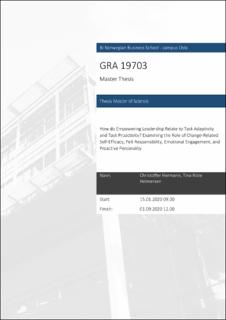How do Empowering Leadership Relate to Task Adaptivity and Task Proactivity? Examining the Role of Change-Related Self-Efficacy, Felt Responsibility, Emotional Engagement, and Proactive Personality
Master thesis

View/
Date
2020Metadata
Show full item recordCollections
- Master of Science [1621]
Abstract
In this thesis, we intended to contribute to the literature by looking at the importance
of leader behavior on performance variables. Particularly, the paper investigated how
empowering leadership influences employees’ task adaptivity and task creativity through
different change-oriented motivational states. We aimed to look at whether change-related
self-efficacy, felt responsibility for change and emotional engagement would influence the
relationship between the mentioned variables. Finally, we tried to understand how proactive
personality moderated the relationship between empowering leadership and the mediating
variables.
Our study examined 307 participants in total. Their change-oriented motivational
states towards changes, concerning the concept of empowering leadership and task adaptivity
and task proactivity were looked into. “PROCESS” was used to review the data that we were
able to gather from people within our network. Our findings suggest that empowering
leadership is important for employees to feel a “reason to” be committed to conduct changes
at work, and accordingly, be more task adaptive and task proactive. Further, empowering
leadership was positively influencing employees’ change-related self-efficacy and their task
adaptivity/proactivity. However, the findings need to be interpreted with caution, as the
internal consistency in the mediating variable was somewhat below limits. We also found that
employees who was emotionally engaged at work, was more task adaptive and task proactive.
However, this is not a result of empowering leadership, due to a non-significant relationship
in our results. Furthermore, our research indicates that employees who are high on proactive
personality, demonstrates a higher sense of felt responsibility for change. However,
empowering leadership was not the reason for the latter relationship.
Finally, practical implications, limitations and directions for future research are
discussed.
Description
Masteroppgave(MSc) in Master of Science in Leadership and Organizational Psychology - Handelshøyskolen BI, 2020